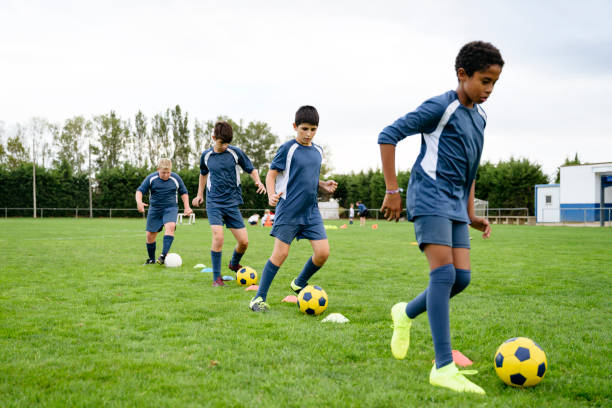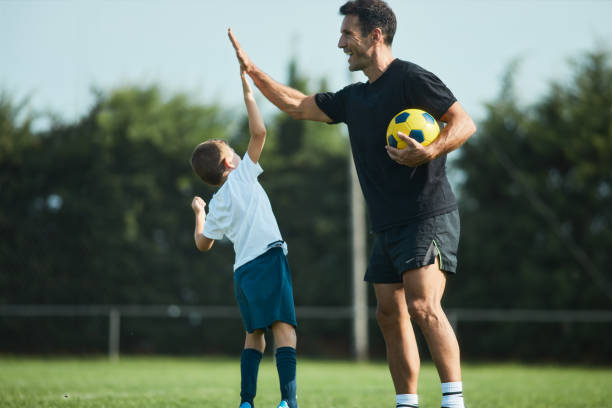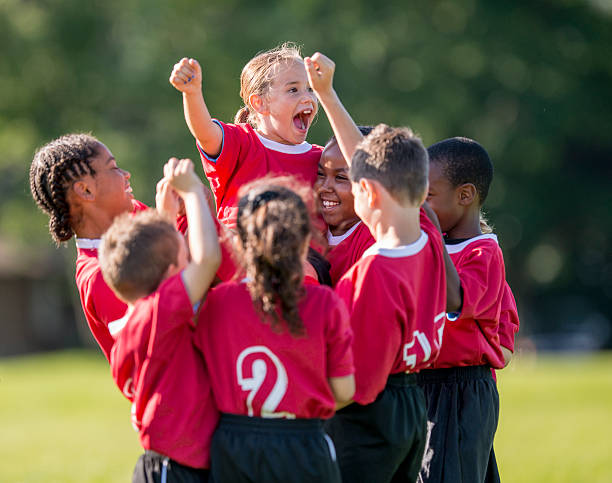Soccer is a great game to play to teach a child healthy physical and mental habits. It is a game played with eleven players who work together against another team to score goals and win as many points as possible.
Working together as a team is just one of the many skills attained by youth soccer players. Not only is soccer an excellent sport for children in it’s ability to assist a child in developing their physical form, but it is also a game that helps a child learn how to think critically and develop their psychological strengths. Soccer actually proves just how flexible the human brain is. Let’s get into it.
#1 Teaches coordination

Obviously, the first thing to about soccer and the brain are the connections that get made between the brain and body– coordination skills that are learned over a long period of time. Although it seems a more physical than mental skill, coordination can be simplified as the brain learning new skills which creates muscle memory.
Learning a new sport or new skills in a sport literally changes the brain for the better! And the coordination learned in playing soccer plays into all other arenas of life for a player. Someone who played soccer is going to have good coordination skills which may help them in their work or life later on as well as be a good confidence boost.
#2 Promotes socialization and teamwork

Especially as children are younger, learning how to play and communicate in a team setting is important. Children who grow up working together in a team may be better able to collaborate as adults in professional settings. Additionally, children who play in teams are being socialized and are growing their people skills by interacting and learning to play with their teammates.
Learning how people act and react, how they think, and how to get along with other people are valuable skills a child playing on a team will learn that will stay with them their whole life.
#3 Increases concentration

Soccer is all about setting goals and achieving them– making the ability to concentrate centerfold in the skills learned by children playing the game. The goals of the players will certainly shift depending on what position they are playing, however, they will still be concentrating very hard.
This learned skill to focus in on a certain task is a great one to learn as a child. If you learn how to concentrate on a goal, and how to self-discipline as a child you may be able to achieve loftier goals as an adult.
#4 Emotional maturity

It is hard playing sports. Tensions are high as the adrenaline gets pumping through your veins. You want to win so bad that it is difficult to cope when you lose, or difficult to control yourself when you win. But with the right coach, a child can learn the emotional tools to control their emotions in these and other difficult situations.
Not only are children learning how to behave in their team, but they’re also learning how to behave as themselves. What kind of winner they are and what kind of loser depends on their ability to self-regulate emotions. These clear-cut situations provide a stage to learn how to handle disappointment or joy or frustration.
#5 Encouragement from coaches

A good coach can positively affect a child for the rest of their life, giving them skills and tools to navigate the game and the child’s life. Getting productive, positive coaching can provide the players with a safe space to be themselves and to learn how to be better versions of themselves.
Seeing how their soccer abilities increase can boost a player’s confidence about their ability to succeed off the pitch as well.
#6 Better mood– the endorphins

We all know that physical activity is good for us. Getting the body moving is key to a better mood and mental health state. Moving the body releases neurotransmitters (endorphins) which attach to the reward center of the brain and this attaching releases the neurotransmitter dopamine.
Dopamine is a brain-created chemical that makes a person feel good. So getting out on the pitch and running around with friends and teammates will give players a mental boost, somewhat like an antidepressant.
#7 Reduce depression, anxiety, and stress

Because of the release of dopamine that acts like an antidepressant when playing sports, children who play sports are less likely to be impacted seriously by depression, anxiety or stress. Playing sports can’t heal a person of mental illness but it can help them cope and lessen the effects.
#8 Look ma, no hands!

Soccer is a limited sport– in the game you cannot use your hands and so are limited to feet and other body parts. This may seem inconsequential, however, the limit of no hands means that the brain has to create new rules when playing soccer to remember not to use the hands.
In other words, the brain becomes elastic in this moment, it learns to make new rules in new situations but to lose those rules when in other situations. Thus, a person who plays a limited sport like soccer has a more flexible brain.
#9 Develops responsibility

A soccer player learns how to be responsible for their actions in playing the game. They learn that their actions have consequences– if the goalie doesn’t catch the ball the other team will score, if the player doesn’t shoot the ball their team might not score at all. This action= consequence is a great lesson for younger players to learn early and will translate into their life later.
#10 Improves problem-solving and analysis skills

Players will be provided with problems to solve in their games. How can they win against a team who has already scored two goals against them? The players, alongside coaches, will have to analyze what the other team is doing and what their team is doing and then problem-solve by deciding what they can do to combat the other team.
So soccer players learn how to put strategies into play by listening to their coaches, analyzing themselves and other teams, and critically thinking about the game.
Conclusion
There are so many benefits of soccer on the brain. It teaches coordination, creates brain flexibility, socializes players, and teaches them how to communicate well with each other.
Learning soccer teaches concentration on goals, and emotional maturity creates better mental well-being and a sense of positive reinforcement from coaches. Playing a team sport, especially soccer has many benefits for younger players' brains and mental development.
